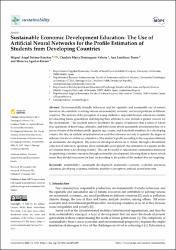Mostrar el registro sencillo del ítem
Sustainable economic development education : the use of artificial neural networks for the profile estimation of students from developing countries
| Licencia | Creative Commons Attribution (CC BY) | es |
| Autor | Solano-Sánchez, Miguel Ángel | |
| Autor | Domínguez-Valerio, Cándida María | |
| Autor | Lendínez-Turón, Ana | |
| Autor | Aguilar-Rivero, Minerva | |
| Fecha de admisión | 2022-02-05T20:22:48Z | |
| Fecha disponible | 2022-02-05T20:22:48Z | |
| Año | 2022 | |
| Citación | Solano-Sánchez, M., Domínguez-Valerio, C. M., Lendínez-Turón, A. y Aguilar-Rivero, M. (2022). Sustainable economic development education: the use of artificial neural networks for the profile estimation of students from developing countries. Sustainability, 14(3), 1192. Recuperado de: | es |
| URI | https://bvearmb.do/handle/123456789/521 | |
| Sinopsis | [English] Environmentally friendly behaviour and the equitable and sustainable use of natural resources can contribute to solving various environmental, economic, and social problems in different countries. The analysis of the perception of young students is important because schools are suitable for educating future generations and shaping their attitudes to also include a greater concern for the environment. This research aims to determine the degree of influence that a series of Likert-type questions of knowledge, attitudes, and behaviours about sustainable development has on a series of items of the student profile (gender, age, course, and household members) in a developing country. | en |
| Idioma | English | es |
| Publicado | Sustainability [2071-1050], 14(3), 1192 | es |
| Derechos | © 2022 by the authors. Licensee MDPI, Basel, Switzerland. | es |
| URI de derechos | https://creativecommons.org/licenses/by/4.0/ | es |
| Materia | Desarrollo sostenible | es |
| Materia | Educación ambiental | es |
| Título | Sustainable economic development education : the use of artificial neural networks for the profile estimation of students from developing countries | en |
| dc.identifier.doi | 10.3390/su14031192 | |
| Tipo de material | Article | es |
| Tipo de contenido | Scientific research | es |
| Acceso | Open | es |
| Audiencia | Technicians, professionals and scientists | es |
Ficheros en el ítem
Este ítem aparece en la(s) siguiente(s) colección(es)
-
Investigación ambiental [1698]


